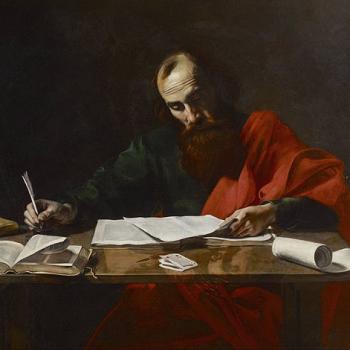This month, columnists and bloggers at Patheos.com have been asked to devote an installment to something or someone we're thankful for in our religious community.
To be honest, this was a very daunting task for me, because I'm thankful for a great many things and for the influences and presences of a huge number of individuals in my life; and, because I'm a polytheist, I don't tend to play favorites, or to find considering one thing or individual more important than all others. But after thinking about it this morning for a while (after having done so on and off since last month when this desideratum was announced), and with a little inspiration from ABBA (for I am weak!), I decided to narrow my focus to three particular groups for whom I'm especially thankful, as well as one individual. First things first:
So I say thank you for the Mystai…!
There are many people in the modern Pagan communities whose work I admire, whose writings I find interesting or inspiring, and whose company I enjoy. There are others in the polytheist communities that I share these admirations for, but that I refer to as my co-religionists because our outlooks, practices, and approaches are so similar that they merit that distinction, since I view polytheism (and Paganisms generally speaking) as religions of practice.
However, there are those who not only share all of the above traits, but their experiences in at least one area of their religious lives is not only something that is held in common between us, but which is something that I've been able to shape in a direct fashion more than perhaps anything else I've done in the modern cultus of Antinous. That is the modern Antinoan Mysteries, as we have been celebrating them since 2004. A very small handful of individuals—by my count, eleven—have undergone this ritual of initiation, often under non-ideal circumstances for both the ones undergoing it as well as myself as the mystagogos. It has been an honor that this number of individuals has allowed me to be the midwife of an experience that is meant to deepen their own relationship and connection to Antinous, and to the community that is devoted to him. I am thankful to them, and to Antinous, for their presence in my life on a regular basis. It isn't easy, on the best of days, re-building a cultus to a late antique super-syncretistic deity who was a deified mortal, but these individuals have contributed tremendously to that effort in a beautiful diversity of ways, and I am grateful for each of them.
I cannot mention the Mystai of Antinous, however, without also mentioning another group, without whom the Mystai would not be what they are today. It is a group that we rapidly came up with a somewhat silly name for, and yet they are incredibly essential. In some ways, I'm even more grateful to them in many respects than I am for the Mystai themselves. This is a group that we call the "Assistai," because they are non-initiates who have decided to forego the possibility of ever undergoing initiation into these Mysteries in order to help others be able to undergo them. They also are essential in helping me to make the Mysteries of Antinous possible at all in a variety of manners.
If modern Antinoan devotion has anything like a bodhisattva, then it is the individuals amongst the Assistai who, by the nature of their roles and commitments, embody that ideal. Some of them have served in this role on multiple occasions and in multiple locations; some of them have only done it once (and likely only will have done it that single time) because the celebration of the Antinoan Mysteries in question took place in a location somewhat remote (e.g. Bonn, Germany; San Jose, CA; Portland, OR) from my usual bases of operations in western Washington and the greater Seattle area. We had originally viewed the Assistai as a kind of stop-gap measure, to assist with the Antinoan Mysteries until such a time as there would be enough Mystai to fulfill all the necessary roles. While that may yet occur on some occasion in the future, it has not yet, and so I envision that the Assistai will be a continued, welcome, and most appreciated group of individuals for the foreseeable future with this practice.
The third group for which I'm very thankful is another one who shares a ritual bond with me and with the Ekklesía Antínoou through the rite known as Communalia. These are, in essence, the "tribal allies" that we have made over the years, and others that we intend to make in the near future but with whom we have not yet solemnized our vows, and I mean that quite literally. As I mused with one of the leaders of one such group several months back, it is like a marriage of sorts between groups, and an agreement that we would "share our underworlds" with them to a degree—not that such is our only duty to one another, but that it is one aspect of what ends up happening. This is why we solemnize our vows in the Communalia ritual over pomegranates or pomegranate juice, which is connected not only to the myth of Hades and Persephone, but also to Hera, one of the goddesses of marriage. I'm grateful to have shared this ritual with Hrafnar, Come As You Are Coven, AMHA, Sharanya, and House Thyrsatrae, and I look forward to doing so in the near future with the Circle of Dionysos and Neos Alexandria, as well as other groups.





